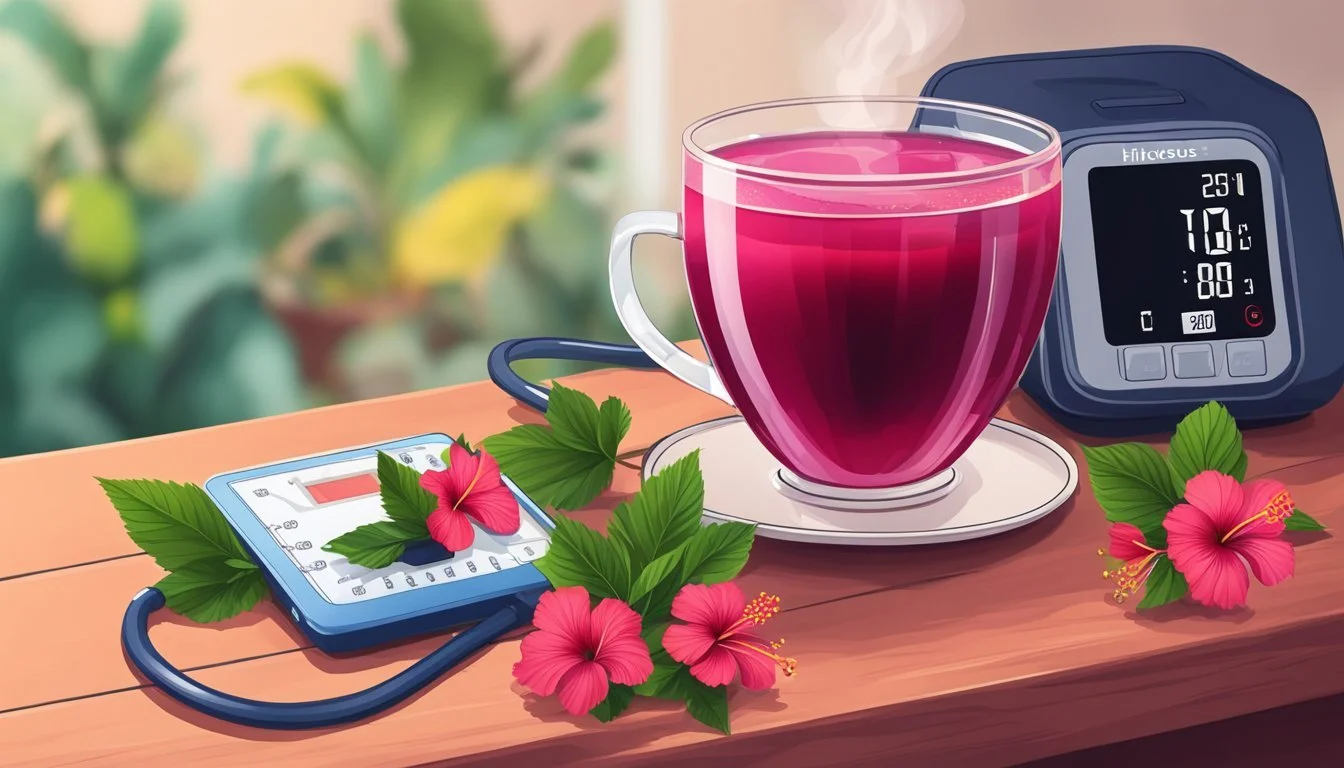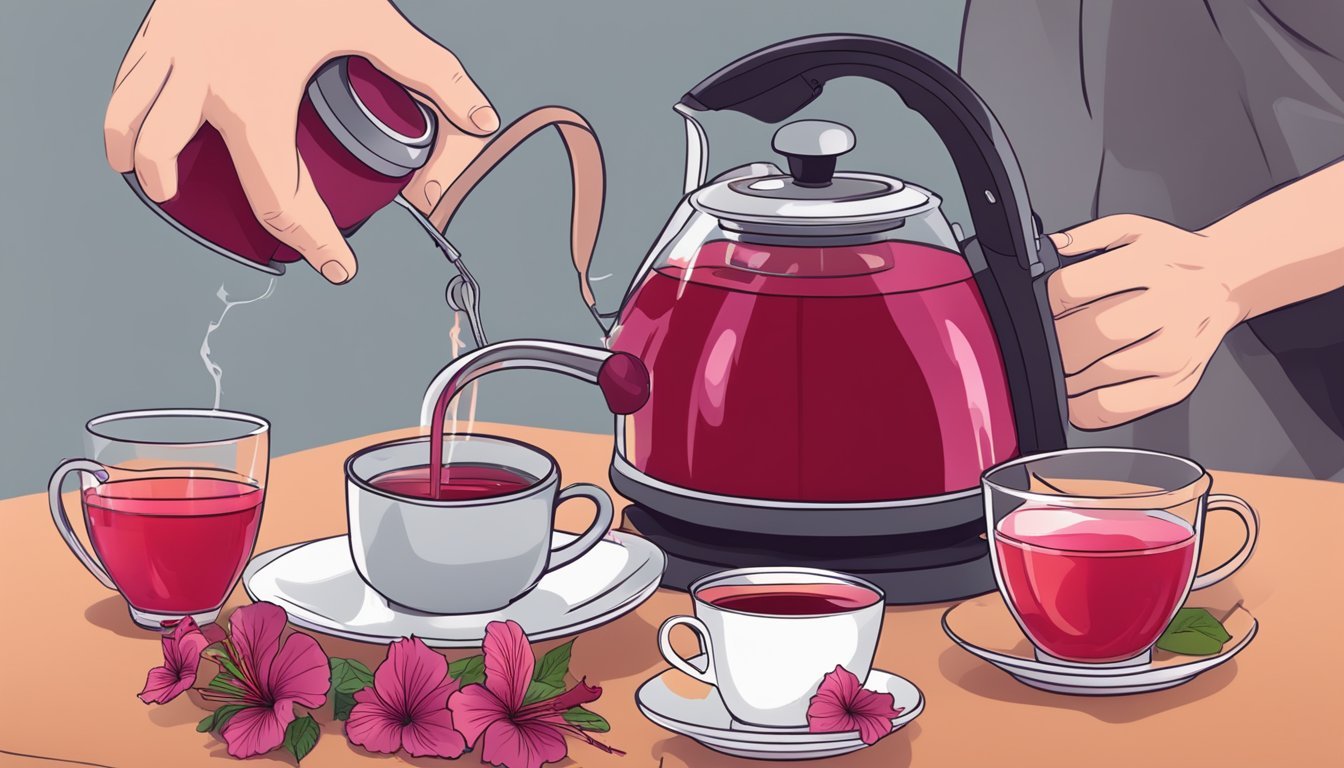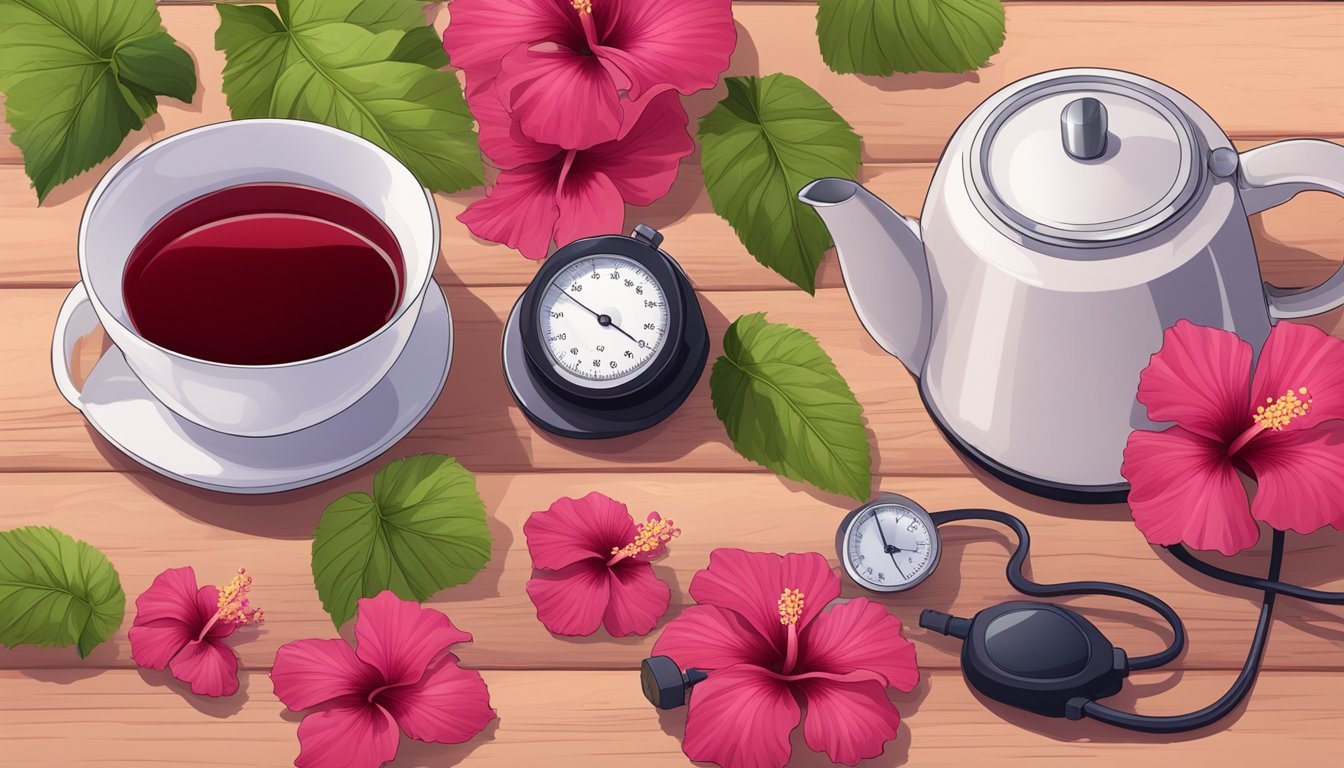Can Drinking Hibiscus Tea Help Lower Blood Pressure?
Understanding the Benefits
Hibiscus tea, a beverage made from the dried parts of the hibiscus plant, has been traditionally enjoyed for its tart flavor and vivid red color. Aside from its popularity as a refreshing drink, this tea has attracted scientific attention for its potential health benefits, particularly concerning cardiovascular health. High blood pressure, or hypertension, is a common condition that poses significant health risks, including the increased chance of heart disease and stroke. Managing blood pressure is therefore a critical component of maintaining heart health.
Recent studies and health experts have pointed to hibiscus tea as a natural agent in lowering high blood pressure. The mechanisms through which hibiscus tea may exert its antihypertensive effects involve the presence of bioactive compounds such as anthocyanins, which are known to have antioxidant properties. These compounds may help in dilating blood vessels, which can reduce the pressure exerted by the blood against vessel walls.
Consumption of hibiscus tea may present a simple, natural way to complement existing lifestyle modifications and treatments for high blood pressure. While it is not a substitute for prescribed medication, incorporating hibiscus tea into a diet could potentially help individuals manage their blood pressure levels. However, the extent of its effectiveness and the optimal amount of consumption vary from person to person, prompting health professionals to recommend moderation and consultation with a healthcare provider before making significant changes to one's health regimen.
Understanding High Blood Pressure
High blood pressure, or hypertension, is a common yet serious health condition where the long-term force of the blood against artery walls is high enough that it may eventually cause health problems, such as heart disease.
Causes of High Blood Pressure
The exact origins of high blood pressure can be multifactorial. Primary hypertension, developing gradually over many years, often has no identifiable cause. Potential contributors include:
Genetics: A family history of hypertension increases the risk.
Age: The risk increases as individuals age.
Lifestyle factors: High salt intake, a lack of physical activity, and obesity.
Chronic conditions: Kidney disease and diabetes.
Secondary hypertension, which occurs rapidly, can arise from conditions that affect the kidneys, arteries, heart, or endocrine system.
Effects on the Body
Unchecked high blood pressure can lead to significant harm to various body systems. Vital effects include:
Cardiovascular system: Can lead to hardened arteries (atherosclerosis), heart attack, or stroke.
Brain: May result in reduced cognitive function or increased risk of stroke.
Kidneys: Strain on these organs can eventually cause kidney failure.
Elevated blood pressure forces the heart to work harder to pump blood, contributing to the weakening of heart muscles over time.
Stage 1 Hypertension vs. Stage 2
Hypertension is categorized into two stages based on blood pressure readings:
Stage Systolic (mm Hg) Diastolic (mm Hg) Stage 1 130-139 80-89 Stage 2 140 or higher 90 or higher
Stage 1 hypertension implies elevated blood pressure that, if sustained, may require lifestyle changes and possibly medication to manage. Stage 2 hypertension is more severe and typically requires a combination of medications and lifestyle modifications to reduce the risk of cardiovascular events.
Hibiscus Tea Overview
Hibiscus tea is a herbal beverage that is caffeine-free and made from the dried parts of the hibiscus plant. Known scientifically as Hibiscus sabdariffa, it has gained a reputation for its potential health benefits, particularly in relation to blood pressure management.
Origins and Popularity
The hibiscus plant, specifically the Hibiscus sabdariffa species, is native to West Africa. The beverage made from hibiscus flowers, also known as sorrel in the Caribbean and roselle in other parts of the world, has a history of use across various cultures spanning from Africa, Asia, to the Caribbean. Its popularity has grown globally owing to its distinctive tart flavor and deep red color.
How Hibiscus Tea is Made
To prepare hibiscus tea, dried hibiscus flowers are steeped in boiling water. This process involves infusing the flowers for about five minutes, which releases the natural flavors and colors of the hibiscus. Once steeped, the liquid can be strained and served either hot or cold depending on preference.
Culinary Uses
Hibiscus tea is versatile. It is frequently consumed as a hot beverage and is equally refreshing served as an iced tea, especially during warmer weather. The tea can be sweetened if desired and is sometimes combined with other flavors, such as mint or ginger. In some cultures, hibiscus is used in cooking, adding a tart flavor to dishes. It is available in various forms, including tea bags and loose dried hibiscus flowers.
Health Benefits of Hibiscus Tea
Hibiscus tea, recognized for its deep red color and tart flavor, has gained attention for its potential role in reducing hypertension and offering various cardiovascular benefits. The tea's rich composition of bioactive compounds like polyphenols, flavonoids, and anthocyanins contributes to its health-promoting effects.
Reducing Hypertension
Studies have linked the regular consumption of hibiscus tea to lower blood pressure levels. The bioactive compounds, particularly the anthocyanins, demonstrate antioxidant and anti-inflammatory effects, which aid in relaxing the blood vessels and reducing hypertension.
Cardiovascular Health
The antioxidant properties of hibiscus tea can benefit cardiovascular health by countering the damage caused by free radicals. Antioxidants also protect the heart and blood vessels from oxidative stress, potentially reducing the risk of heart disease.
Cholesterol and Liver Health
Some evidence suggests that hibiscus tea can influence cholesterol levels, promoting a healthy lipid profile. It may also support liver health by improving the liver's ability to process fats and toxins, due partly to its flavonoid content.
Weight Management and Metabolic Syndrome
There is an emerging correlation between weight loss and hibiscus tea due to its impact on metabolic factors. It may help in controlling weight and reducing the symptoms of metabolic syndrome, an antecedent to type 2 diabetes.
Anti-cancer Potential
The high levels of vitamins C and minerals, as well as the presence of other plant compounds in hibiscus tea, might contribute to its potential to hinder cancer cell growth. While preliminary, this research points toward the tea's role in possibly reducing inflammation and combatting cancer.
Hibiscus tea's broad array of health benefits, especially its ability to address high blood pressure and support cardiovascular and liver health, make it a promising natural option for health-conscious individuals. However, it should be noted that while these benefits are supported by some studies, further research is required to fully establish the extent and mechanisms of hibiscus tea's health effects.
Scientific Evidence of Efficacy
Recent clinical studies have provided tangible evidence supporting the consumption of hibiscus tea in the management of high blood pressure. This section examines specific findings from scientific research focusing on blood pressure reduction and other health-related benefits associated with hibiscus tea.
Studies on Blood Pressure Reduction
Clinical Trial Findings: A randomized, double-blind, placebo-controlled study involving 65 adults with pre- and mild hypertension found that drinking hibiscus tea over a 6-week period led to significant reductions in both systolic and diastolic blood pressure. Participants who were not on any blood pressure-lowering medications recorded weekly blood pressure measurements to observe the effectiveness of the treatment.
Comparative Outcome with other Teas: Evidence indicates that hibiscus tea contains lower catechin percentages than green or black teas. Despite this, hibiscus tea's impact on blood pressure is noteworthy, suggesting an advantage in its consumption for individuals with mild hypercholesterolemia.
Other Health-Related Studies
Cardiometabolic Markers: Further scientific investigations have associated the consumption of Hibiscus sabdariffa with favorable effects on cardiometabolic health markers. Specifically, studies have hinted at the potential for hibiscus tea to influence cholesterol and blood sugar levels, pointing towards its broader health benefits beyond blood pressure management.
Clinical Efficacy: Systematic reviews and meta-analyses, while acknowledging the variability in study quality, support the efficacy of Hibiscus sabdariffa in treating hypertension and hyperlipidemia. The consistent reporting of blood pressure decrease in control groups of different studies reinforces the therapeutic potential of hibiscus tea in health conditions related to cardiovascular risk.
How to Consume Hibiscus Tea
Consuming hibiscus tea can be both enjoyable and beneficial for health, particularly for those looking to manage their blood pressure. The following information outlines the preparation, intake, and varieties in which hibiscus can be consumed.
Brewing the Perfect Cup
One must be precise with recipe selection and steep time to make an optimal cup of hibiscus tea. Use about 1-2 teaspoons of dried hibiscus flowers per cup (8 ounces) of water. The water temperature should be just below boiling, around 200°F. Steep the flowers for 5 minutes for a strong flavor; one can adjust the time for a milder taste. Strain the tea to remove the flowers before drinking.
Daily Recommended Intake
While there's no strict guideline on the consumption frequency of hibiscus tea, it's generally recommended to consume 1-2 cups per day. This amount allows one to enjoy the benefits without overconsuming. Those with medical conditions should consult a healthcare professional before adding hibiscus tea to their diet.
Alternative Forms of Hibiscus
In addition to traditional tea, hibiscus extract is another option. The extract is often available in capsule form or as a liquid that can be added to water. While the extract offers a concentrated form of the beneficial compounds found in hibiscus, the drink preparation typically involves simply mixing the extract with water according to the product's instructions. It is important to follow the manufacturer's guidelines on dosage when using hibiscus in concentrated forms.
Potential Risks and Considerations
While hibiscus tea is praised for its potential to lower high blood pressure, it is crucial to consider the possible risks and how it may interact with various health factors and medications.
Interaction with Medications
Hibiscus tea can interact with certain medications, especially those used for managing hypertension. For instance, it may have an additive effect when taken with diuretics like hydrochlorothiazide, potentially leading to excessively low blood pressure. Moreover, compounds in hibiscus tea may affect the rate at which the liver metabolizes medications, similar to the impact on drugs like acetaminophen.
Pregnancy and Breastfeeding
Health experts often advise against the medicinal use of hibiscus during pregnancy due to potential effects on the estrogen levels, which could theoretically affect pregnancy outcomes. Since comprehensive safety data is lacking, this precaution is also extended to breastfeeding women, to prevent any unforeseen impact on the nursing infant.
Allergies and Individual Sensitivities
Individuals may experience allergies or sensitivities to hibiscus tea. Symptoms of an allergic reaction could include an upset stomach or more severe reactions in rare cases. While hibiscus possesses antibacterial properties, beneficial to inhibiting bacteria such as E. coli, people with a history of sensitive stomachs should proceed with caution due to its potential to cause irritation.
Consulting with Healthcare Professionals
Before incorporating hibiscus tea as a complementary approach to manage blood pressure, it's crucial to consult healthcare experts. They can provide guidance on effective use and potential interactions with existing conditions and medications.
When to Seek Advice
Patients should seek the counsel of healthcare providers if they have hypertension or are on medications for blood pressure. A healthcare provider can assess the potential benefits of hibiscus tea in the context of their overall health condition and the medications they are currently taking. Registered dietitians can offer advice on integrating hibiscus tea into a dietary plan that aligns with patient-specific nutritional needs and health goals.
Incorporating Hibiscus Tea into a Health Plan
Consulting with a healthcare professional is essential when making dietary adjustments that include hibiscus tea. This is especially pertinent for individuals with health conditions that could be impacted by changes in diet or fluid intake. A proactive discussion with a healthcare provider can help to ensure that adding hibiscus tea to one's diet is a safe and beneficial move. They can provide a tailored plan that takes into account the unique interactions between diet, medications, and health conditions.
Conclusion
Research indicates that hibiscus tea is potentially beneficial for lowering blood pressure. It is a caffeine-free, tart beverage rich in antioxidants that can promote cardiovascular health. Studies, including a 2017 study, suggest that consuming hibiscus tea may contribute to a decrease in blood pressure levels, notably when incorporated into a healthy lifestyle with a balanced diet.
Adding hibiscus tea to one's diet should be a thoughtful choice, done in conjunction with regular physical activity and dietary choices that support overall cardiovascular health. While hibiscus tea can aid in managing blood pressure, it should not be viewed as a standalone solution or replacement for prescribed medication.
Individuals with specific health conditions or those already on blood pressure medications should consult with a healthcare professional before incorporating hibiscus tea into their regimen. It is essential to ensure that there are no adverse interactions with existing medications or health issues.
Moderation is key, and while hibiscus tea can be part of a balanced diet, reliance solely on any single food or beverage for health benefits is not advisable. A mindful and comprehensive approach to health, incorporating a variety of nutritionally rich foods and healthy habits, is the best strategy for managing blood pressure and ensuring overall wellness.





